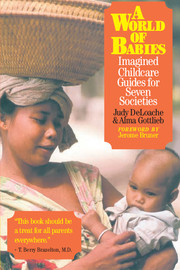Book contents
- Frontmatter
- Contents
- Foreword
- Editors’ Acknowledgments
- Note to the Reader
- CHAPTER ONE If Dr. Spock Were Burn in Bali: Raising a World of Babies
- CHAPTER TWO A Parenting Manual, with Words of Advice for Puritan Mothers
- CHAPTER THREE Luring Your Child into This Life: A Being Path for Infant Care
- CHAPTER FOUR Gift from the Gods: A Balinese Guide to Early Child Rearing
- CHAPTER FIVE Making Babies in a Turkish Village
- CHAPTER SIX Infants of the Dreaming: A Warlpiri Guide to Child Care
- CHAPTER SEVEN The View from, the Wuro: A Guide to Child Rearing for Fulani Parents
- CHAPTER EIGHT Never Leave Your Little due Alone: Raising an Ifaluk Child
- Note to Chapter One
- About the Contributors
- Authors' Acknowledgments
- Citations and Sources Cited
- Index
CHAPTER TWO - A Parenting Manual, with Words of Advice for Puritan Mothers
Published online by Cambridge University Press: 05 September 2014
- Frontmatter
- Contents
- Foreword
- Editors’ Acknowledgments
- Note to the Reader
- CHAPTER ONE If Dr. Spock Were Burn in Bali: Raising a World of Babies
- CHAPTER TWO A Parenting Manual, with Words of Advice for Puritan Mothers
- CHAPTER THREE Luring Your Child into This Life: A Being Path for Infant Care
- CHAPTER FOUR Gift from the Gods: A Balinese Guide to Early Child Rearing
- CHAPTER FIVE Making Babies in a Turkish Village
- CHAPTER SIX Infants of the Dreaming: A Warlpiri Guide to Child Care
- CHAPTER SEVEN The View from, the Wuro: A Guide to Child Rearing for Fulani Parents
- CHAPTER EIGHT Never Leave Your Little due Alone: Raising an Ifaluk Child
- Note to Chapter One
- About the Contributors
- Authors' Acknowledgments
- Citations and Sources Cited
- Index
Summary
THE PURITANS OF NEW ENGLAND
In the contemporary United States, stereotypes abound regarding the Puritans of colonial New England. Adherence to a strong work ethic, emphasis on moral character, suspicion of outsiders, and religious intolerance are among the characteristics commonly attributed to the Puritans. Historians, however, have characterized the Puritans in several contradictory ways: Some emphasize their responsibility for the founding of democracy in America, whereas others describe their creation of a grim and joyless theocracy based on rigid obedience of God's commands. Still other historians credit the Puritans with forging a complex intellectual and humanistic society whose faith served as a stimulus to strive for a better world for themselves and their children. Revisionist history is partially responsible for these differing views, although each model accurately reflects some aspect of New England Puritan society.
Puritan roots extend to seventeenth-century England, during the time of the reforms by the Protestant Church of England as it broke away from Roman Catholicism. Those who felt the Church of England was not doing enough to purge the theological influence of Catholicism became known as Puritans because of their desire to further “purify” the church by ridding it of elements such as vestments, ceremony, and sacraments. Puritan leaders and parents believed that a move to the New World could protect their children from the “Common corrupcions of this euill world” – what they perceived as the corruption and profanity of seventeenth-century English society.
- Type
- Chapter
- Information
- A World of BabiesImagined Childcare Guides for Seven Societies, pp. 29 - 54Publisher: Cambridge University PressPrint publication year: 2000
- 3
- Cited by

